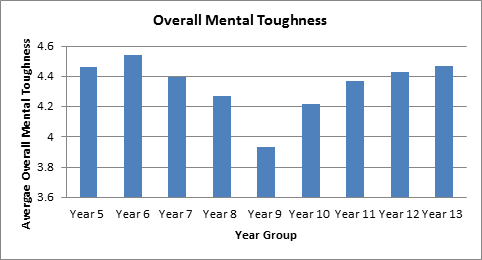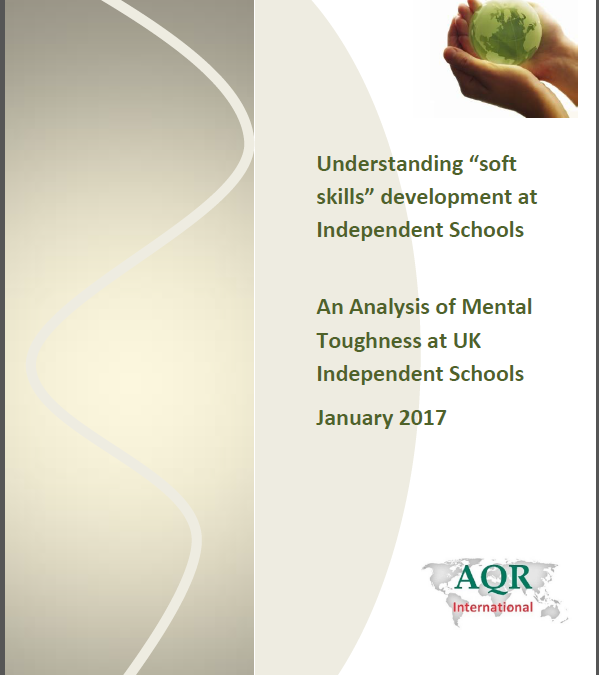Assessing Mental Toughness
The study provided a unique opportunity to assess almost 10,000 pupils in 60 schools using the 4Cs mental toughness framework.
The data emerging from what is a very significant study has been interesting, valuable and insightful. Importantly what has emerged is useful to everyone involved in educating and developing young people.
This commentary focuses on that. Initially it draws attention to some key findings.
Mental Toughness is a personality trait which describes to a significant extent how we respond mentally to stress, pressure, challenge and opportunity. It describes “how we think” which is an important determinant on “how we act” (behaviour) and “how we feel” (our emotional response to events). Research shows that an individual’s mental toughness is a factor in attainment, wellbeing, positive behaviour and aspirations. Often described as life skills all are important in education.
The MTQ48 psychometric is a high quality instrument which measures mental toughness across its 4 components – the 4Cs – Control, Commitment, Challenge and Confidence. Individual results are scored on a 1-10 scale (for the technically savvy this is a normally distributed sten scale).
So what emerged?
Possibly the most interesting set of results was the trend across age (year groups). This showed that across the whole sample, scores for pupils in years 5 & 6 (generally 9 and 10 year olds) were at a reasonable level. In year 7 there was a slight fall off (possibly explained by the impact of transition to secondary school). However there was a significant falling away in years 8 & 9.
The scores show an upward trend from years 10 through to year 13 but appear then to be broadly in line with the original scores at year 6!
This is shown below:

This is interesting for a number of reasons. It has recently been the subject of discussion in the UK – years 8 & 9 are often called the “lost years”. The scale of this study illustrates that there is something to be examined and understood here.
Firstly, how is this significant? We know that mental toughness correlates with attainment. Could flattening the dip enable mental toughness develop to a higher level – with its consequential benefits in exam performance, well -being (mental health) and behaviour.
Secondly, why does this dip occur? An area ripe for research, several hypotheses have been offered ranging from hormonal changes in adolescents, a lack of awareness about what is happening through to schools underplaying the importance of pupil development in the these middle years.
Even more interesting is the observation that looking at data by component (the 4Cs) shows that there are different patterns emerging. The most severe dip appears to occur with the Life Control subscale (this is where the sense of “can do” sits) and recovers slowly. Commitment (goal orientation) dips and never fully recovers. Both are important in attainment and wellbeing.
Should we doing something about this? It is likely that focusing attention on soft skills development and doing it in a more balanced way would be much more effective and beneficial to all stakeholders – pupils, parents, staff, schools etc..
Developing these life skills and developing mental toughness purposefully in years 7 – 10 is perfectly possible. The tools and techniques are there. They are easily built into curriculum. What might be required in a better more holistic approach to soft skills development.
Usefully, we were able to rank the participating schools by average mental toughness score for pupils tested. When we repeated the exercise by component (each of the 4 Cs) we got a different rank order for each of the 4 Cs!
The obvious question is why does that occur? It clearly needs further research, but we think that it might be that all schools are doing something in terms of developing these soft skills but that most are focusing on one aspect or another where they might more usefully adopt a more balanced approach.
Ultimately the purpose of the ISC study was to pin down some evidence around some of the myths and ideas that circulate in education. The study has done that and it has shown its value in signposting schools and educators generally to where productive development can take place.
And the learning is valuable for all schools – independent and states sector alike.
Doug Strycharczyk, CEO, AQR International and Peter Clough, Professor of Applied Psychology at Manchester Metropolitan University.
Enquiries should be addressed to doug@aqr.co.uk
For a copy of the reports please email headoffice@aqr.co.uk
AQR are running webinars discussing the results further please got to either link to register your interest in attending
https://aqrinternational.co.uk/event/independent-schools-soft-skills-study-webinar-1 https://aqrinternational.co.uk/event/independent-schools-soft-skills-study-webinar-2


